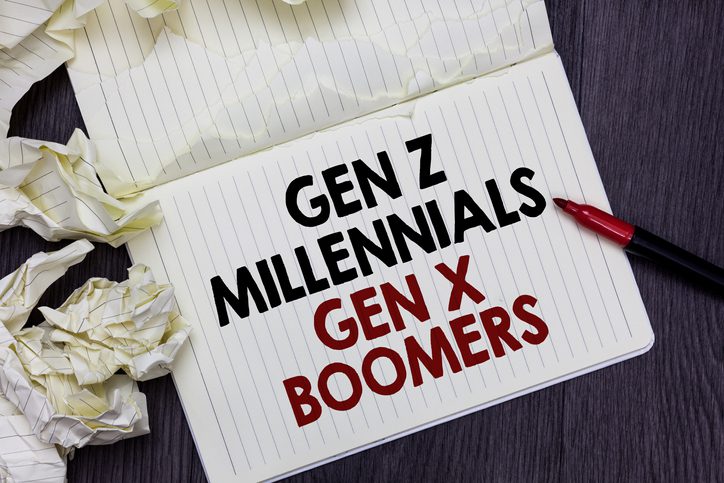
How Brands Market To the Different Generations
Generational marketing is a type of marketing that targets the needs and desires of different demographic groups according to their age. Deliberately segmenting consumers into generations allows brands to target their campaigns more effectively, ensuring they are communicating with the correct group of people at the right time. With that in mind, the following is a guide on marketing to different generations.
Understanding The Different Generations 
Four generations make up the majority of the American population. These include the baby boomers (1946-1964), Generation X (1965-1980), Millennials (1981-1996), and Generation Z (1997 or later).
- Baby boomers: Because they are now entering retirement age, they have less disposable income than before. Their spending habits tend to focus more on maintaining a particular lifestyle. They are particularly interested in the quality of the products they purchase, rather than getting good deals.
- Generation X: This generation is marked by wariness and pragmatism. They continue to search for better opportunities, even in their adult years. Generation X is particularly passionate about convenience, quality, and frugality. They are the least likely to spend their money impulsively.
- Millennials: The Millennials are tech-savvy and independent thinkers who reject tradition and gravitate towards purposeful innovation. As a result of this mindset, they are disillusioned with the status quo. They are highly individualistic and value authenticity, diversity, and inclusion.
- Generation Z: Generation Z is currently the youngest generation. Identifying traits of Generation Z include a desire to be unique among their peers and use technology for social good. They are also strong entrepreneurial.
How to Market To Different Generations 
Different generations grow up with access to different types of media. They also have different needs, wants, and fears. Keeping this in mind, the following are a few tips on how to market to each generation:
Marketing to Baby Boomers
Boomers by far prefer to engage via email marketing. You can still reach them via TV commercials as well. However, it’s more challenging to engage them through mobile content. Many Boomers have Facebook profiles and can be driven to take action through social marketing and content marketing. Well-written content can go a long way towards converting a Boomer.
Boomers are also more likely to prefer direct engagement via phone and would rather not rely on complicated technology. Promotional offers are more likely to appeal to boomers than other generations.
Marketing to Generation X
Most of Generation X is technologically adept. They are as present on social media as the younger generations. However, they are more likely than other generations to do thorough research before making an online purchase.
You can reach Generation X most effectively through Facebook and email marketing. But they do tend to prefer mobile engagement throughout their buyer’s journey. Brand loyalty is meaningful to them, so loyalty programs work well when targeting Generation X customers. You can also effectively engage them using video content.
Marketing to Millennials
Millennials are the first generation raised with the internet, which means they are a very digital-savvy generation. Social marketing is effective when reaching Millennials because social media has played a significant role in their lives since childhood. You’re less likely to reach Millennials using email or other direct marketing methods. They tend to be more interested in finding relevant content than other generations.
They’re also distrustful of commercial advertising and value integrity and authenticity. Millennials want a personal connection with the company they’re buying from, which means personalization is essential. Word-of-mouth is crucial to building their brand trust. Finally, they want to be entertained, so they engage with influencers a lot.
Marketing to Generation Z
Generation Z is the first generation to grow up in a post-9/11 world. They tend to be more skeptical than other generations regarding advertising messages. Because they were born into a world dependent on technology, they have short attention spans and constantly bounce between any number of screens (phones, tablets, laptops, desktops, and computers).
Like Millennials, the brands they purchase from must be ethical and authentic. The best way to reach Generation Z is by using an omnichannel marketing strategy and focusing on social media engagement. Not only are Generation Z members are likely to share their opinions about brands online, but they are highly engaged with social media influencers.
Understanding Your Audience
Understanding your target audience is crucial to figuring out how to reach them. After all, your brand’s target audience may not consist of every generation. Certain marketing techniques that work well for Baby Boomers (such as email marketing) won’t be as effective for Generation Z.
Develop your buyer personas to identify what generations your brand’s target audience consists of before creating a generational marketing strategy to reach and engage with them.




 WHO: The Madison Area Builders Association, Milwaukee Metropolitan Builders Association, and NARI of Madison have come together to host a BuildX conference, a one-day conference focusing on empowering women in the construction industry.
WHO: The Madison Area Builders Association, Milwaukee Metropolitan Builders Association, and NARI of Madison have come together to host a BuildX conference, a one-day conference focusing on empowering women in the construction industry.
